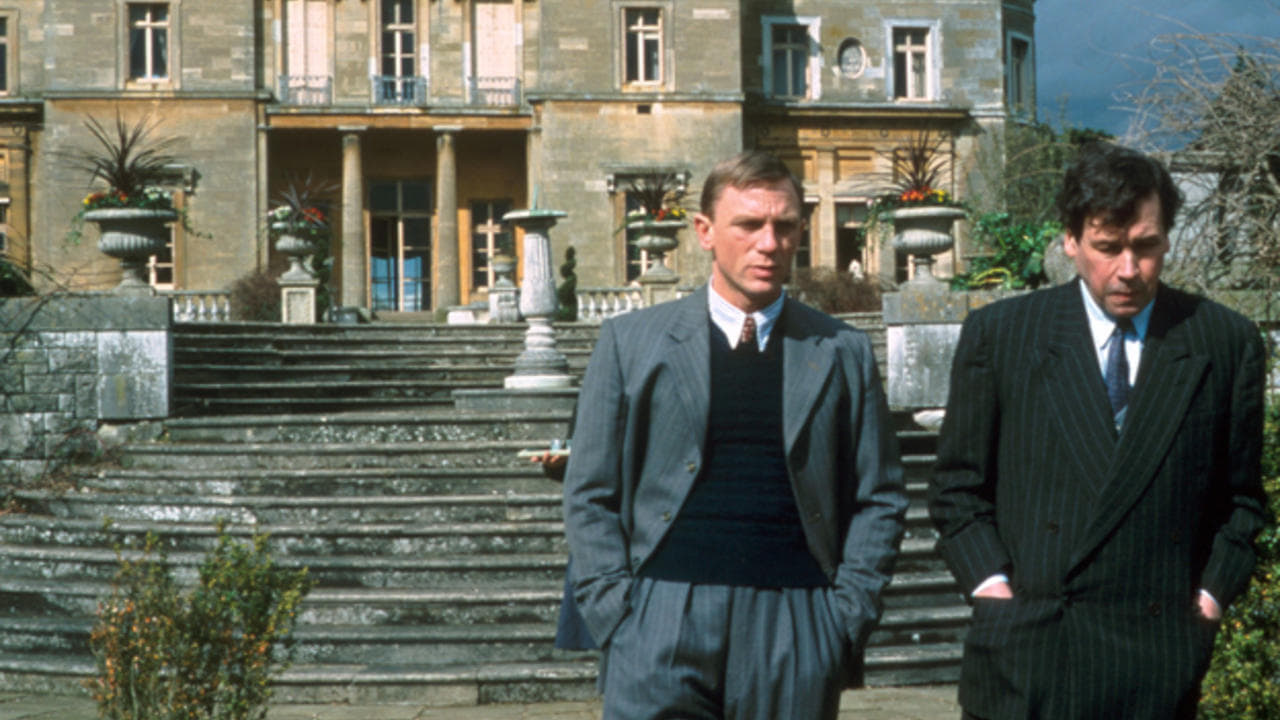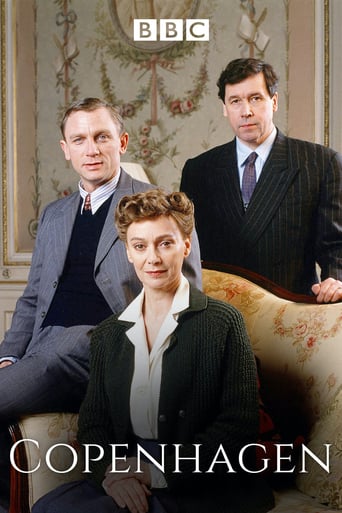

Copenhagen is a challenging and powerful film that requires close attention. It builds up in rapid layers and, though it only has three characters, they each are articulate and extremely significant figures in their own right. The rise of Nazi Germany from 1933 on casts its shadow over events and the dynamic discussions and attempts at communication occurring. The audience is privy to both what people say, and their thoughts about what they are saying. It is based on the drama by Michael Frayn. Denmark is an occupied country. Hitler's forces have invaded and control most of Europe (Sweden, Switzerland and Portugal are neutral). Director Howard Davies also wrote the script for the film with Michael Frayn who wrote the original theater play. Frayn is present in a detailed prologue and epilogue to the body of the TV movie that provides a detailed description of the context of the play, and some historical background. In the essential question of why Werner Heisenberg went to see Niels Bohr in 1941 is re-assessed. There are also interviews with living relatives of the two greats that reveal that it is possible Heisenberg wanted Bohr to know that he was in charge of the German work on a nuclear weapon and could delay its achievement (in the end he claims they were two weeks away from success, while Bohr queries his neglect of the consequent radiation from an explosion that would kill them—another example of the human error that bedevils the practical use of nuclear energy). IN his final years Bohr penned many drafts of a letter to Heisenberg, that was never posted, and his family guaranteed for 50 years. Bohr's "confessions" were not available to Frayn when he wrote the play. Werner Heisenberg (1901-1976) and Niels Bohr (1885-1962) first met in Gottingen, Germany, when Heisenberg was 20 and challenged Bohr's mathematical calculations at a public talk. Heisenberg would spend six years in Copenhagen working under Bohr. Bohr had first developed a theory of the structure of an atom that became known as Quantum Mechanics (not nuclear physics), for which he was awarded a Nobel Prize in 1927. Their interactions stimulated Heisenberg to further develop Quantum Mechanics and the theoretical concept of the Uncertainty Principle in 1927 when he was 26 years old, for which he won a Nobel Prize in 1932 (not 1933 as said in the film, and an award which included recognition of his discovery of allotropic hydrogen).
... View MoreIn the late 1920s, Werner Heisenberg and Niels Bohr worked closely together to formulate the "Copenhagen interpretation", a philosophical synthesis that provided a basis for understanding the radical new field of quantum mechanics that they (and others) had recently developed. But when world war two broke out, Heisenberg's country (Germany) invaded Bohr's (Denmark): Bohr was eventually to leave home and contribute to the successful allied efforts to develop a nuclear weapon, whereas Heisenberg led the failed German program. But in 1941, when Bohr still lived in Denmark, Heiseberg visited him, and the subject of that meeting has subsequently become a matter of speculation and controversy. Bohr felt that Heisenberg had come on an intelligence-gathering mission and sent him packing; Heisenberg claimed that his (poorly formulated) aim had been to establish a consensus among physicists, to promote continued research into the nature of the atom while denying a weapon to their political masters on both sides. Heisenberg continued to claim, after the war, that he hadn't wanted to build a bomb for the Nazis; but it seems likely that he had not been in a position to do so anyway having failed to conceive one essential idea. If Heisenberg was not a saint, this does not make him a figure of pure evil either: indeed, while the evils of Nazism make him easy to condemn, it's surely also easy to understand the pressures on a patriotic man trying to pursue his great love, theoretical physics, when his country was ruled by monsters. In Michael Frayn's play, 'Copenhagen', now adapted for television, Heisenberg is depicted as a man racked by uncertainty: if his approach to Bohr was confused, Frayn suggests that Heisenberg himself didn't really know what he wanted, at least not in the context of a world at war. As one of Heisenberg's own contributions to physics is known as the "uncertainty principle", there's an open goal for that the dramatist cannot resist, and he frames his imaginative reconstruction of the two men's encounter (whose substance is well-documented) in the language of physics itself, using analogies to their great research to describe their personal outlooks and predicaments. Though probably not literally accurate, it's skilfully done, and as well as exploring the ambiguities of their situation, also makes one interested in the physics itself; the three person cast are all excellent in this version.
... View MoreOver the years the meeting between two old friends, physicists Niels Bohr and Werner Heisenberg, which took place in Copenhagen during 1941, has been the subject of much speculation. In particular, Heisenberg's motives for calling the meeting have been scrutinized and brought into question given the nature of his work at the time on the Nazi's nuclear programme.The structure of the screenplay brilliantly examines the varying interpretations of what took place during the meeting in a way that borrows from Eisenberg's Heisenberg's uncertainty principle.I thought that the performances were, as you would expect from Francesca Annis, Daniel Craig and Stephen Rea, flawless, and despite the seemingly dry subject matter of a meeting between two physicists to discuss nuclear physics, I found the plot gripping.I found it extremely enjoyable and would recommend it to anybody who enjoys a thought provoking story (regardless of the extent of their knowledge of nuclear physics!)
... View MoreI saw Michael Frayn's stage play 'Copenhagen' in London ... in fact, I was technically *IN* the play, as Peter Davison's set design seated some of the audience members onstage directly above the actors, like a tribunal sitting in judgment, and I chose to watch the play from one of these onstage seats. (I also saw the play on Broadway in the same circumstances, so technically I was onstage during both productions.) This brilliant drama is basically an interplay of ideas between three highly intelligent minds: a concept which works better onstage than in a film or a teleplay. So, when 'Copenhagen' was adapted for television by the BBC, I was eager to see how they would 'open up' this story ... and whether or not the transition would work.It works astonishingly well. During the Second World War, brilliant young physicist Werner Heisenberg was in Germany, working towards the Nazi government's efforts to develop a nuclear bomb. Meanwhile, Heisenberg's older mentor and friend, Niels Bohr, was working quietly in his native Denmark (under Nazi occupation at the time) along with his wife Margrethe. Bohr's wife was not a trained physicist, but many people who knew the Bohrs stated that she was an active partner in his work, and that Mrs Bohr deserves to share credit for Bohr's achievements. In 1941, Heisenberg journeyed to Copenhagen to visit his old friends the Bohrs, although their disparate allegiances during the war had strained the friendship. To this day, historians debate why Heisenberg visited the Bohrs at this time. Also debated is Heisenberg's loyalty to the Nazi cause. Did Heisenberg actively try (and fail) to develop an atomic bomb for the Third Reich? Or was Heisenberg secretly an anti-Nazi who covertly harmed the German war effort by pretending to work on the bomb whilst sabotaging his labmates' efforts? As with the assassination of JFK, there are many different theories as to what 'really' happened here. Heisenberg devised the Uncertainty Principle of quantum physics, so it's ironic that we can never be certain about what really occurred in Copenhagen.The TV version of 'Copenhagen' is brilliant. The action is opened up by having Heisenberg journey to Copenhagen (on a vintage 1940s railway train) while an internal monologue plays on the soundtrack. When he meets the Bohrs, the three of them stroll through various (extremely beautiful) buildings and landmarks in Copenhagen, with an occasional Nazi soldier walking past to remind us that Denmark is effectively part of the Third Reich. The period detail is impeccable throughout, and the locations are a delight to look at.The script of this teleplay is actually superior to the stage version. In the stage play, after Bohr is identified as 'the pope of quantum physics', his wife replies: 'yes, you were the pope ... but Einstein was God'. This is a cheap joke, meant to raise a laugh from audience members who recognise Einstein yet who lack of knowledge of Bohr's achievements. With due respect to Einstein, the historical fact is that Niels Bohr achieved far more in the field of quantum physics than any other three scientists combined, including Einstein ... so I was grateful that the Einstein joke was removed here. (Einstein's achievements were in relativity, not quantum theory.) Another, much better line from the stage play is retained, when Heisenberg contemplates the concept of 'quantum morality' ... in other words, the journey from Good to Evil (or vice versa) can only be made in a single quantum leap, with no gradual transition from one state to the other. Intriguing!I wish that the script of 'Copenhagen' (stage or screen version) had included a crucial irony which was mentioned in the playbill of the London production: namely, that most of the important work in the development of the atomic bomb was achieved by Jewish scientists, precisely **because** of policies implemented by the Nazi government. In Nazi Germany, applied physics was considered a much more prestigious field of research than theoretical physics, so Jewish scientists were shut out of employment opportunities in the former, and they concentrated their research efforts in the latter ... which was the field that developed the atomic bomb.The excellent actor Stephen Rea does fine work as Bohr, and his castmates are splendid too. If you're looking for car chases or action sequences, 'Copenhagen' is not for you. But if you want to experience brilliant acting, sumptuous locales and an exchange of provoking ideas, then I recommend 'Copenhagen' ... and I rate this TV movie 10 points out of 10. This fascinating drama won't Bohr you. (Sorry, I couldn't resist!)
... View More